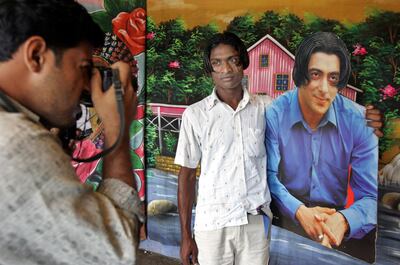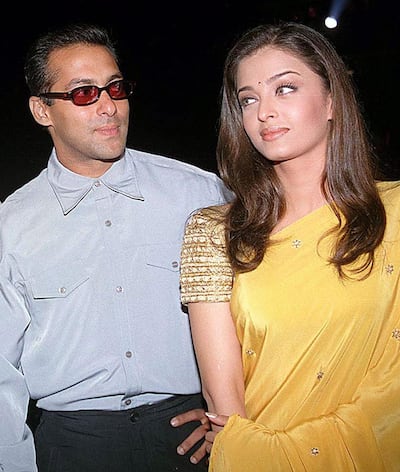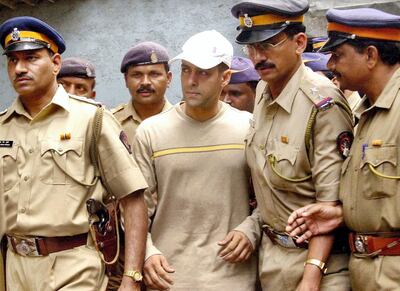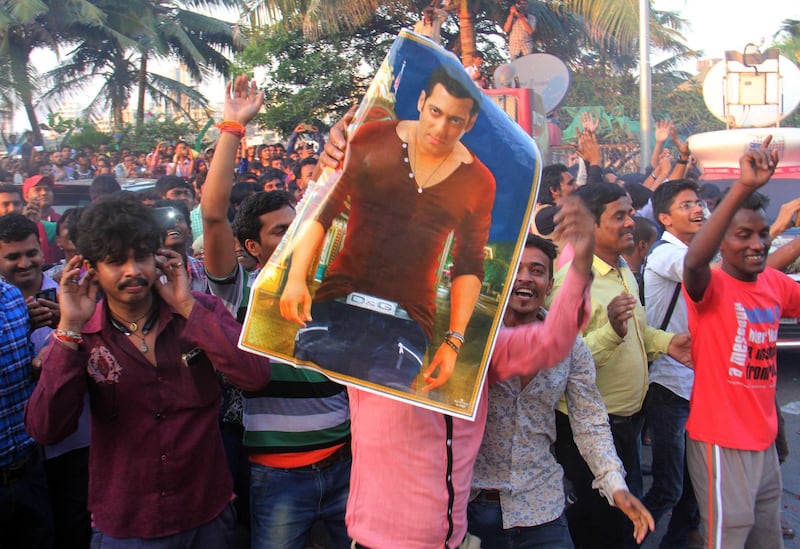How Salman Khan remains relevant at a time when Bollywood's aristocracy is on shaky ground in a changing media market remains an enigma for most film critics and industry pundits. Even Shah Rukh Khan isn't safe in the current climate: he released a trailer for his new movie Zero, and there is nervousness among his camp about how it will fare at the box office – because his last vehicle, Jab Harry Met Sejal, sank without a trace. Salman Khan doesn't ever have to worry about the box office, however, because there is something about the actor that makes him immune to the vagaries of the film trade.
So how did an actor who doesn't even pretend to act became one of the nation's most bankable film stars?
Bollywood star power
The answer lies in the history of movie-going in India.
At the turn of the millennium, swanky multi-screen cinemas catering to the middle and upper classes replaced single- screen theatres across much of the nation. Traditionally, single cinema halls served as an affordable form of recreation for the nation's poor – they were even divided by class, informally, into lower stalls, upper stalls, and the "dress circle".
However, with the rise of the multiplex, Bollywood decided to eschew the egalitarian ideas of socialist India, and the link that connected the average Indian to celluloid was snapped overnight. In came glossy dramas about how the rich live, filmed in exotic locales across the globe. As a result, actors, too, started aspiring towards films about "shiny, happy people", which were far removed from the reality of millions and millions of Indians. In an additional development, realism as a genre became fashionable, as more filmmakers started accessing world cinema through their DVD library, so they also started taking on parts that gave them a faux-thespian edge.

After all, everyone in Bollywood secretly likes that Filmfare award on their shelf, even if it's rumoured that they're often bought – indeed, in an interview with Hindustan Times last year, movie star Rishi Kapoor revealed that he had bought his Best Actor award, for his role in the film Bobby, back in 1973.
However, while everyone changed tack, Salman stayed loyal to the single-cinema days and chose to remain an everyday hero – and he certainly did not graduate to becoming a thespian. The glossy phase of Indian cinema – circa the early noughties – also turned out to be his worst phase, personally.
Bad reputation
For one, his fall-out with Bollywood diva Aishwarya Rai (who said she was in an abusive relationship with the actor) was especially public in 2002. In March that year, her parents filed a police complaint against him. To make matters worse, a few months later, in September, his Toyota Land Cruiser allegedly ran over homeless people, killing one, injuring many. Compounding this horrific incident was the actor's involvement in an illegal hunting spree in 1998, in which he allegedly shot dead endangered blackbucks in Rajasthan during the filming schedule for Hum Saath-Saath Hain. His co-stars Saif Ali Khan, Tabu and Sonali Bendre were also accused.

It seemed like a career cul-de-sac for the man, and Salman was considered history to most film pundits at this point. But, for the people of India, he only became bigger. The irony is that in an era when stars were increasingly turning to PR agencies to project a glossy image to the public, he was tarnishing his image from every angle imaginable. Circa 2002, for the middle classes who were religiously reading newspaper reports, he was an abusive misogynist, an ecological miscreant, and a rich kid who had mowed down poor people.
However, in the eyes of millions of cine-goers who had been refused entry to multiplexes due to the prohibitive costs of a ticket, Salman became an egalitarian icon worth celebrating. Unlike Shah Rukh Khan and Aamir Khan, who chose the loftier ideas of a new Bollywood, Salman's films were rudimentary no-brainers. Each of his scandals became an escutcheon of an imagined war against the downtrodden by the media and elite.
Changing times in India
It needs to be noted that as India got increasingly right-wing and its minorities became vulnerable in the post-socialist climate, Bollywood remained a bastion of secularism for millions of Muslims across the subcontinent.
This parallel is not that different from the United States, where its African-American population is oppressed on many fronts, but many of its most renowned pop-culture figures (especially in the music industry) are black.
For an India reeling from the Godhra riots of 2003, in which more than a thousand Muslims died in a pogrom in Gujarat, the ascendancy of the Muslim Khans in Bollywood’s top tier also gave the illusion of an industry where faiths are treated equally – and also the image of a country that is tolerant.
In fact, most of Salman's blockbusters land in cinemas during the Eid weekend every year, which allows a wider window for a release to set the cash registers ringing. And oh, how they do. He flies in the face of fashion with an only-I-can-pull-this-off chutzpah, but it would be a misnomer to assume that there is no PR machinery steering his rise to invincibility: for instance, a battalion of lawyers fight very hard to keep him out of jail. With India's courts being notoriously slow, justice takes time to be delivered.

While waiting for a ruling on the blackbucks case, Salman conveniently started a non-governmental organisation (NGO) called Being Human. Started in 2007 with the aim to uplift the poor, it also functions as an apparel brand or "a clothing line with a heart". And the trick has worked. Being Human T-shirts are ubiquitous in an India teeming with Salman Khan fans. His line is also available in the UAE at Splash.
If that were not enough stardom, in 2008, he started his TV innings as a host on 10 Ka Dum, a game show inspired by Power of 10. It went on to garner one of the highest TRPs that season. The icing on the Salman Khan cake, though, is Bigg Boss. He decided to host the reality TV game show, along the lines of Big Brother, in 2010. Not only was the show stupendously successful, spawning many seasons, but it became congruous with Salman's own twisted journey to mega-stardom.
_______________________
Read more:
Top 10 Bollywood power couples, ranked
First official picture of Salman Khan on 'Bharat' Abu Dhabi set released
Watch: First glimpse of Saaho showcases Prabhas and Abu Dhabi
[ From big weddings to #MeToo: all the drama in Bollywood this year ]
[ Is 2019 going to be the year that Bollywood finally grows up? ]
_______________________
In the show, the producers notoriously pick fragile, off-kilter stars from the film and TV industry. The person offering them advice, or criticism, is Salman, Bollywood's most legendary brat. As they say, experience is the best teacher.
Will Salman’s star ever fall? Well, just as his brand was bolstered by the rise of the multiplex – which excluded the working class from the cinema – it may be deflated as companies like Netflix bring content straight to smartphones, and get cheaper and cheaper. Or perhaps it’s the law that will finally catch up with him.





